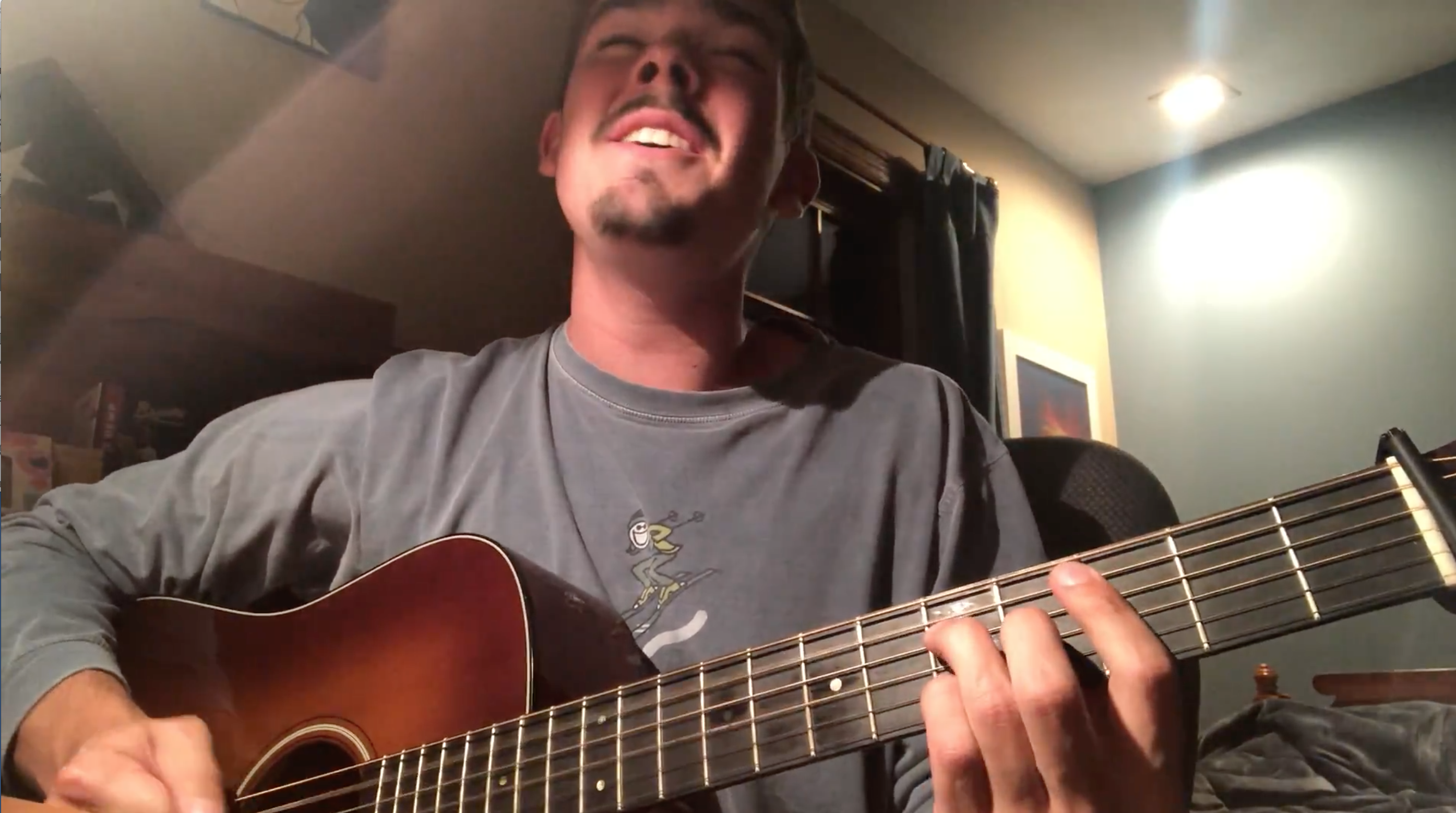As they compose, perform and share music, students and faculty are finding comfort and connecting.
As people around the world contend with all of the changes that the COVID-19 pandemic brings with it, they are coping and finding solace however they can. A quick search online will lead to suggestions from any number of experts: mental health professionals, yoga instructors and even chefs with recommendations for comfort food recipes. Some students and professors in the Elon community have found their own solutions within the power of music.
Plenty of academic research illustrates the good that music does for the brain. Senior Lecturer in Music Clay Stevenson notes how singing can elevate your mood by changing brain function. But beyond the quantitative data, music offers benefits that are personal and profound. It resonates with emotions related to faith, interconnectedness, nostalgia and personal expression.
Cera Baker ’20, a music production and recording arts major, has been working on her Senior Seminar capstone project while at home. Part of that work involves original songwriting, and she said that conveying her emotions through lyrics is helping her cope. The emotions she’s feeling have served as inspiration for her, and she wrote a song about the pandemic called “Invisible Enemy.”
“Having music in my life has never felt more important to me than it has during this quarantine,” Baker said. “Putting what I’m feeling into lyrics has been a sort of ‘musical journaling’ because I’m helping myself get through everything I’ve been experiencing by turning it into music.”
Stevenson’s students are also working together now, virtually, as they create music. This type of collaboration sparks another positive response, connection. He said that connecting with others serves as a powerful coping mechanism for his students as they process their responses to the pandemic’s effects.
While musicians playing music together provides one type of connection, Mabel Kitchens ’21, the general manager of Elon’s radio station, WSOE, explained that as a lover of music she’s experiencing connectedness in a different way. Live shows have been canceled and musicians are relying on digital platforms to perform for fans. Kitchens said she’s been tuning in to virtual live shows, trying to be present to participate and support music in the ways she can while at her family’s home in South Carolina.
Through watching these virtual performances, she said she is able to connect on a personal level with the artists she admires. Although audiences and artists aren’t together in the same club, they’re forging a unique connection as they share parts of themselves rather than a physical space. Musicians are performing in intimate spaces at home, and the online platforms allow for back-and-forth exchanges between everyone, introducing conversation that likely wouldn’t happen at a live performance. Kitchens recently watched an Instagram Live benefit show with the artist Paper Daisies and said she noticed interesting things happening as a result of the platform.

“It was cool to see the barrier between artist and fan disappear,” Kitchens said. “He’s in his bedroom playing, and his friends were gathering outside in the yard, visible through the window behind him. People watching online were asking him questions and he’s responding. That interaction humanizes performers, making them more relatable.”
Eli Wheeler ’21 has noticed a positive online trend of creatives supporting other creatives through virtual benefit concerts. Now that artists who normally support themselves by performing live are unable to tour, many are struggling financially. Other musicians are stepping up, playing benefits for those whose needs are greater than their own.
“I think this grows the already strong community of creatives and reminds me that it is possible to tangibly help your neighbor, sometimes in strange ways,” Wheeler said.
A musician himself, Wheeler finds connection to his faith through music. He sings with Elon’s Gospel Choir and said music has always been a form of reflection and prayer for him. The two are deeply interconnected.
“Music is one of the most consistent ways I connect with God,” Wheeler said. “Another way I connect with God is through interactions with people. So, in the absence of that consistent interaction, I am really cherishing the moments I spend playing music as a way to renew my hope and affirm my identity in Christ.”
Lecturer in Music Virginia Novine-Whittaker has continued to teach individual lessons via WebEx and hears varied reactions from students about how they are coping. One student shared that practicing playing saxophone provided an escape from the stress and sadness of the current situation. He said that when he plays his saxophone, he can block out everything but the music. And on a personal level, Novine-Whittaker said that music is a comforting force for her as well.
“Music has always provided a way for me to express my emotions,” she said. “Playing pieces I have learned through the years is like spending time with old friends. It transports me to another time and place. It reminds me of how beautiful life can be.”



